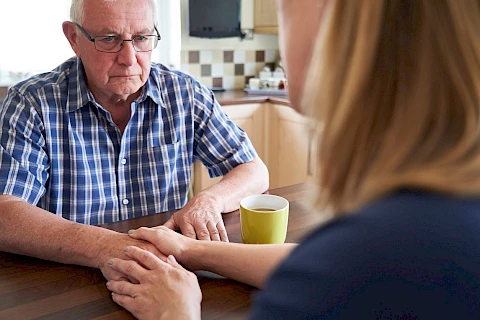
World Mental Health Day is an opportunity to focus on senior emotional well-being. Age-related physical limitations or changes in their social circles can contribute to feelings of isolation, anxiety, or depression. Recognizing these challenges and offering compassionate support enables seniors to navigate emotional hurdles more effectively, promoting a positive mental outlook.
Mental Health Issues in Older Adults
Seniors often face unique emotional challenges, including depression and anxiety, usually stemming from health issues, loss of independence, or the passing of loved ones. Chronic health conditions, such as arthritis, diabetes, or heart disease, can also increase stress and anxiety.
Age-related cognitive decline and dementia, such as Alzheimer's disease, can affect memory, thinking skills, and the ability to carry out simple tasks. This can contribute to anxiety, as individuals may feel they are losing control over their lives.
Many seniors also experience loneliness and social isolation, especially if they live alone or are far from family. Additionally, the loss of friends and family members can result in deep sadness and grief.
Recognizing the Signs
Pay attention to behavioral changes that may indicate a decline in a senior loved one’s mental health. It could be a red flag if a senior begins to withdraw from social activities or shows a lack of interest in hobbies they once enjoyed. Changes in daily habits, such as a shift in routine or persistent sadness, may signal that something is amiss. Other signs to watch out for include:
- Persistent sadness
- Irritability
- Increased anxiety
- Unexplained aches
- Changes in appetite
- Difficulty sleeping
Strategies for Providing Support
One way to support senior mental health is by encouraging open communication. Create a safe space where seniors feel safe sharing their feelings and concerns. Promoting social engagement by encouraging participation in community activities, family gatherings, or even regular phone calls with loved ones can also combat isolation.
A consistent daily routine can provide a sense of stability and purpose. Provide mental stimulation through puzzles, reading, or learning a new skill to keep their mind engaged and promote cognitive health. Gentle exercises like walking or yoga can boost mood and overall well-being. Just remember to consult a healthcare provider before introducing seniors to a new exercise routine.
Building a strong emotional connection with the senior in your care is essential. Spend quality time together to build trust and rapport. Show kindness and patience in your interactions. Remember that your support can make a significant difference in their emotional well-being.
Finding Professional Help and Resources
If you notice persistent or worsening symptoms, it may be time to consult a professional. Mental health professionals such as psychologists, psychiatrists, and counselors can provide specialized care tailored to the needs of older adults. Online resources like the National Institute on Aging website can offer valuable information, and hotlines such as the National Suicide Prevention Lifeline are available for immediate support.
Senior Helpers Provides Caring Companionship and Conversations
If you have a senior loved one who can benefit from the caring companionship of a professional in-home care provider, we can help. Senior Helpers of South Minneapolis provides personalized senior care solutions, including assistance with daily living tasks, companion care, personal care, and more. Contact us to explore your options in Minneapolis, Saint Paul, Minnetonka, and Hennepin County!